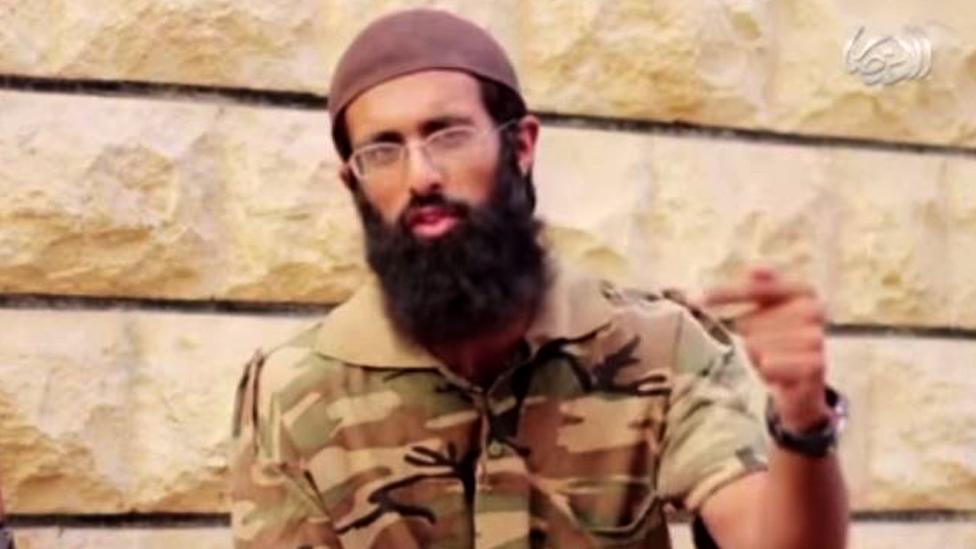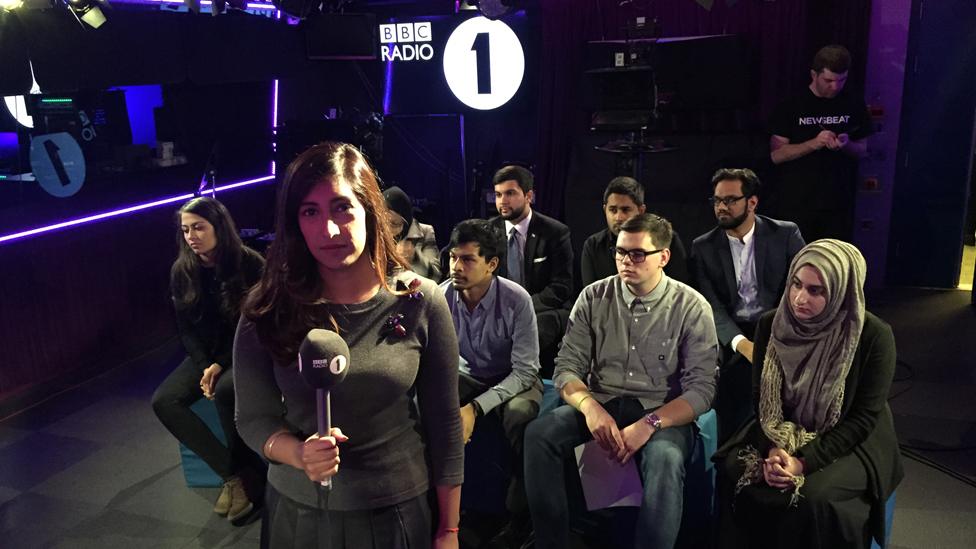Young, British and radicalised: Why people want to join Islamic State
- Published

After the terrorist attacks in Paris, Radio 1 Newsbeat held a debate on what drives some young people to join so-called Islamic State (IS), also known as Isis.
In a live debate on Radio 1 - Young, British and Radicalised - we asked what motivates some to head to Syria and Iraq.
A small number of British Muslims have joined the notorious group.
It is responsible for mass killings, abductions and beheadings.
We also heard the story of Omar, a 27-year-old from High Wycombe in Buckinghamshire, who is now fighting for Islamic State in Syria.
Nicknamed the "supermarket jihadi" by newspapers, because he once worked in Morrisons, he is now considered such a global threat that he is on a UN sanctions list, external set up to tackle terrorism.
He has appeared in a propaganda video calling for David Cameron and other world leaders to be "real men" by sending in ground troops rather than bombing IS from the air.
"You're fighting people who love death more than life," he says, in the chilling video.
BBC Newsnight journalist Secunder Kermani has spent time talking to Omar online.
He says that much of what Omar told him about fighting in battles with IS was "really shocking" - but that Omar was at other times very polite and even "nice".
Omar spoke online about his early life and what set him on a path towards radicalism.
"My childhood was good, nothing out of the ordinary," he explains, but then he says he became a "lost sheep".
"I started to question 'what am I doing?'"
A school friend said Omar "became progressively religious" to "calm himself down a bit".
Omar, like other young jihadis originally from Britain, claims that events following the 9/11 attacks in the US and "unjust Western foreign policy" have been a key motivating force for them.
"I remember seeing the Twin Towers collapse," Omar says, "...thinking it was in the UK, but then read a subtitle that said 'happened in America'..."
"I didn't [at first] pay much attention... but that triggered a long-term effect on me."
Rashad Ali, from the Institute of Strategic Dialogue, works with young people attracted to radical ideology.
He says the way these people look at the world is to think "everything the West has done is evil and the West is to blame for everything."
In his audio messages, Omar also describes wanting to go to defend the "weak and oppressed women, children and elderly neglected by the West" in the war in Syria.
Rashad Ali says "there are a number of things mixed up" in his rationale.
Watch the video: Why Islamic State has so many different names, external
"Of course there are problems in the Muslim world... but Isis is not helping [refugees] by forcing their way of religion."
Omar describes the excitement of making his journey to Syria to do his "Islamic duty" because, he says, he was "leaving the land of immorality and going to a land of jihad.
"For any believer that's paradise, man."
Omar was initially stopped at the airport before travelling to Syria via Turkey. But, he says, he managed to continued his journey "by blagging it the whole way through".
"Whilst we have powers, we have to still have evidence... to support any arrest we make," West Midlands Police said in response.
Gang culture
Ismael Lea South, a rapper and activist who converted to Islam, says the crossover with gang culture is clear.
"In gangs there is a sense of brotherhood, if you mess with one you mess with all of us," he explains.
"Many people who are isolated, going through issues, when they are in a gang they feel a sense of belonging.
"In Islam we are taught we are all one brotherhood, but certain extremist groups use that to exploit their poison."
'War on terror generation'
After 9/11 and then the 7/7 bombings in London, many believe an "us and them mentality" emerged.
"There is greater polarisation between Muslims and non-Muslims in British society," says Alyas Karmani, an imam in Bradford.
"There is a sense that young people growing up, the 'war on terror generation', have been exposed to a barrage of Islamophobia in the media, negative portrayals of Muslims.
"Every day seeing death and destruction... through horrific high definition images fed directly to their smartphones and social media feeds.
"This is unlike any other generation, being exposed to so many traumatic uncensored images.
"This has a really quite profound effect on them. When young people have no-one to talk to - and express their ideas to - it's deeply unsettling for them.
"For some kids it might manifest into [joining] a gang or binge drinking or anti-social behaviour or self-harm.
"It just so happens that for young Muslims it manifests itself into extremism, for some of those kids.
"It's the counter culture they gravitate towards."
Racism and a sense of exclusion helps fuel this feeling, say many young Muslims.
It is why the hashtag #Notinmyname has become a regular sight on social media after any incident, like the Paris attacks, which is linked to Islamist extremism.
Young Muslims feel frustrated they are expected to apologise for the actions of "deranged individuals".
"Asking me to apologise, you're already assuming I'm an outsider," they say.

Join Tina Daheley and a group of young people discussing what it's like being a young Muslim in the UK today
'An epic battle'
Many Islamic State recruits believe they are taking part in an "important episode of human history".
IS think what is happening in Syria marks the start of the apocalypse.
They believe in Muslim prophecies that an epic battle between Christianity and Islam will lead to the appearance of the anti-Christ and eventually the day of judgement.
Alyas Karmani describes one 17-year-old he spoke to who had a "totally utopian idea" of Syria being a "promised land" before travelling there to join IS.
Karmani says he told the teenager that "Isis has no legitimacy whatsoever.
"It cannot claim to be the Islamic State. Scholars have condemned this. The Koran itself says ask people with knowledge if you do not know yourself."
The teenager later died fighting for IS.
Listen to a live Newsbeat on debate now on Radio 1.
For more stories like this one you can now download the BBC Newsbeat app straight to your device. For iPhone go here, external. For Android go here, external.